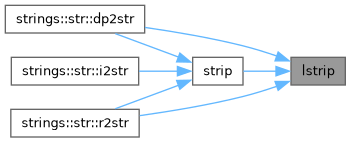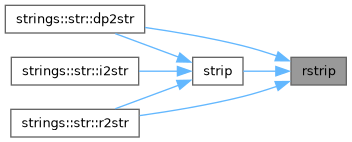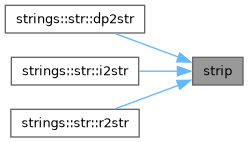This module defines functions to manipulate strings of characters. Description. More...
Data Types | |
| interface | str |
| str() converts a number (integer or real) to a string More... | |
Functions/Subroutines | |
| pure character(len=:) function, allocatable, public | upper (s) |
| Returns a copy of the string converted to uppercase. | |
| pure character(len=:) function, allocatable, public | lower (s) |
| Returns a copy of the string converted to lowercase. | |
| pure character(len=:) function, allocatable, public | swapcase (s) |
| Return str with case of letters swapped. | |
| pure character(len=:) function, allocatable, public | reverse (s) |
| Reverse a string. | |
| pure logical function, public | endswith (s, suffix) |
| Return True if S starts with the specified prefix, False otherwise. | |
| pure logical function, public | startswith (s, prefix) |
| Return True if S starts with the specified prefix, False otherwise. | |
| pure character(len=:) function, allocatable, public | lstrip (s, chars) |
| This function returns a copy of the string with leading chars removed. | |
| pure character(len=:) function, allocatable, public | rstrip (s, chars) |
| This function returns a copy of the string with trailing chars removed. | |
| pure character(len=:) function, allocatable, public | strip (s, chars) |
| This function returns a copy of the string with leading and trailing chars removed. | |
| pure integer function | count_sub (s, sub, start, end) |
| Return the number of occurrences of substring sub in string S[start:end]. | |
| pure logical function, public | issub (s, sub) |
| Returns .True. if sub is present in S, .False. otherwise. | |
| pure character(len=:) function, allocatable, public | rjust (s, width, fillchar) |
| Returns a right-justified string of length width. | |
| pure character(len=:) function, allocatable, public | ljust (s, width, fillchar) |
| Returns a left-justified string of length width. | |
| pure character(len=:) function, allocatable, public | zfill (s, width) |
| Pad a string with zeroes ("0") to specified width. If width is <= input string width, then the original string is returned. | |
| character(len=:) function, allocatable, public | center (s, width, fillchar) |
| Center a string to a specified width. The default character to fill in the centered string is a blank character. | |
| integer function, public | find (s, sub, start, end) |
| Return the lowest index in S where substring sub is found. | |
| character(len=:) function, allocatable, public | replace (s, old, new, count) |
| Return a copy with all occurrences of substring old replaced by new. | |
| integer function, public | str2i (s_in) |
| character(len=:) function, allocatable | z2str (zin) |
| z2str gives a string representation of a complex number | |
| function | zarr2str (vec) |
| function | dparr2str (vec) |
| function | rarr2str (vec) |
| function | iarr2str (vec) |
| character(len=:) function, allocatable | dparr2d2str (vec) |
| character(len=:) function, allocatable | rarr2d2str (vec) |
| character(len=:) function, allocatable | iarr2d2str (vec) |
| character(len=:) function, allocatable | zarr2d2str (vec) |
Detailed Description
This module defines functions to manipulate strings of characters. Description.
Function/Subroutine Documentation
◆ center()
| character(len=:) function, allocatable, public center | ( | character(len=*), intent(in) | s, |
| integer, intent(in) | width, | ||
| character(len=1), intent(in), optional | fillchar ) |
Center a string to a specified width. The default character to fill in the centered string is a blank character.
- Parameters
-
[in] s Original string [in] width Total width of centered string [in] fillchar Padding character (default to space)
- Returns
- A centered string of length width.
◆ count_sub()
| pure integer function count_sub | ( | character(len=*), intent(in) | s, |
| character(len=*), intent(in) | sub, | ||
| integer, intent(in), optional | start, | ||
| integer, intent(in), optional | end ) |
Return the number of occurrences of substring sub in string S[start:end].
- Parameters
-
[in] s Original string [in] sub substring to count [in] start initial position to consider [in] end final position to consider
- Returns
- Number of occurrences of sub in S
◆ dparr2d2str()
| character(len=:) function, allocatable dparr2d2str | ( | real(dp), dimension(:, :), intent(in) | vec | ) |
- Parameters
-
[in] vec Vector of numbers to convert
- Returns
- String created
◆ dparr2str()
| function dparr2str | ( | real(dp), dimension(:), intent(in) | vec | ) |
- Parameters
-
[in] vec Vector to convert
◆ endswith()
| pure logical function, public endswith | ( | character(len=*), intent(in) | s, |
| character(len=*), intent(in) | suffix ) |
Return True if S starts with the specified prefix, False otherwise.
- Note
- that differs from python method in that does not accept a tuple
- Parameters
-
[in] s Original string [in] suffix substring to test
- Returns
- .True. if S ends with sub.
◆ find()
| integer function, public find | ( | character(len=*), intent(in) | s, |
| character(len=*), intent(in) | sub, | ||
| integer, intent(in), optional | start, | ||
| integer, intent(in), optional | end ) |
Return the lowest index in S where substring sub is found.
- Returns
- position where found
- Parameters
-
[in] s original string [in] sub substring to find [in] start initial position to search [in] end final position to search
Referenced by str::dp2str(), and str::r2str().

◆ iarr2d2str()
| character(len=:) function, allocatable iarr2d2str | ( | integer, dimension(:, :), intent(in) | vec | ) |
- Returns
- String created
◆ iarr2str()
| function iarr2str | ( | integer, dimension(:), intent(in) | vec | ) |
- Parameters
-
[in] vec Vector to convert
◆ issub()
| pure logical function, public issub | ( | character(len=*), intent(in) | s, |
| character(len=*), intent(in) | sub ) |
Returns .True. if sub is present in S, .False. otherwise.
- Parameters
-
[in] s Original string [in] sub substring to find
- Returns
- True if sub is present in S
◆ ljust()
| pure character(len=:) function, allocatable, public ljust | ( | character(len=*), intent(in) | s, |
| integer, intent(in) | width, | ||
| character(len=1), intent(in), optional | fillchar ) |
Returns a left-justified string of length width.
- Note
- The string is never truncated
- Parameters
-
[in] s Original string [in] width width of padded string [in] fillchar Char used for filling
- Returns
- 0-padded string
◆ lower()
| pure character(len=:) function, allocatable, public lower | ( | character(len=*), intent(in) | s | ) |
Returns a copy of the string converted to lowercase.
- Parameters
-
[in] s Original string
- Returns
- String converted to uppercase
Referenced by str::dp2str(), and str::r2str().

◆ lstrip()
| pure character(len=:) function, allocatable, public lstrip | ( | character(len=*), intent(in) | s, |
| character(len=*), intent(in), optional | chars ) |
This function returns a copy of the string with leading chars removed.
If chars is not present all blank: spaces (achar(32)) and tabs (achar(9)) are removed.
- Note
- that when used with no chars argument differs from intrinsic trim in that it will also strip "tab" characters
- Parameters
-
[in] s Original string [in] chars chars to remove from S
- Returns
- String with chars removed
Referenced by str::dp2str(), str::r2str(), and strip().

◆ rarr2d2str()
| character(len=:) function, allocatable rarr2d2str | ( | real(sp), dimension(:, :), intent(in) | vec | ) |
- Returns
- String created
◆ rarr2str()
| function rarr2str | ( | real(sp), dimension(:), intent(in) | vec | ) |
- Parameters
-
[in] vec Vector to convert
◆ replace()
| character(len=:) function, allocatable, public replace | ( | character(len=*), intent(in) | s, |
| character(len=*), intent(in) | old, | ||
| character(len=*), intent(in) | new, | ||
| integer, intent(in), optional | count ) |
Return a copy with all occurrences of substring old replaced by new.
- Parameters
-
[in] s original string [in] old substring to replace [in] new substring to substitute from old [in] count Maximum number of occurrences to replace
- Returns
- New string created
◆ reverse()
| pure character(len=:) function, allocatable, public reverse | ( | character(len=*), intent(in) | s | ) |
Reverse a string.
- Parameters
-
[in] s Original string
- Returns
- Reversed string
◆ rjust()
| pure character(len=:) function, allocatable, public rjust | ( | character(len=*), intent(in) | s, |
| integer, intent(in) | width, | ||
| character(len=1), intent(in), optional | fillchar ) |
Returns a right-justified string of length width.
- Note
- The string is never truncated
- Parameters
-
[in] s Original string [in] width width of padded string [in] fillchar Char used for filling
- Returns
- 0-padded string
◆ rstrip()
| pure character(len=:) function, allocatable, public rstrip | ( | character(len=*), intent(in) | s, |
| character(len=*), intent(in), optional | chars ) |
This function returns a copy of the string with trailing chars removed.
If chars is not present all blank: spaces (achar(32)) and tabs (achar(9)) are removed.
- Note
- that when used with no chars argument differs from intrinsic trim in that it will also strip "tab" characters
- Parameters
-
[in] s Original string [in] chars chars to remove from S
- Returns
- String with chars removed
Referenced by str::dp2str(), str::r2str(), and strip().

◆ startswith()
| pure logical function, public startswith | ( | character(len=*), intent(in) | s, |
| character(len=*), intent(in) | prefix ) |
Return True if S starts with the specified prefix, False otherwise.
- Note
- that differs from python method in that does not accept a tuple as prefix
- Parameters
-
[in] s Original string [in] prefix substring to test
- Returns
- True if S starts with prefix
Referenced by zfill().

◆ str2i()
| integer function, public str2i | ( | character(len=:), intent(in), allocatable | s_in | ) |
- Returns
- Integer to convert
- Parameters
-
[in] s_in String converted
◆ strip()
| pure character(len=:) function, allocatable, public strip | ( | character(len=*), intent(in) | s, |
| character(len=*), intent(in), optional | chars ) |
This function returns a copy of the string with leading and trailing chars removed.
If chars is not present all blank: spaces (achar(32)) and tabs (achar(9)) are removed.
- Note
- that when used with no chars argument differs from intrinsic trim in that it will also strip "tab" characters
- Parameters
-
[in] s Original string [in] chars chars to remove from S
- Returns
- String with chars removed
References lstrip(), and rstrip().
Referenced by str::i2str(), and str::r2str().


◆ swapcase()
| pure character(len=:) function, allocatable, public swapcase | ( | character(len=*), intent(in) | s | ) |
Return str with case of letters swapped.
- Parameters
-
[in] s Original string
- Returns
- String with cases swapped
◆ upper()
| pure character(len=:) function, allocatable, public upper | ( | character(len=*), intent(in) | s | ) |
Returns a copy of the string converted to uppercase.
- Parameters
-
[in] s Original string
- Returns
- String converted to uppercase
◆ z2str()
| character(len=:) function, allocatable z2str | ( | complex(dp), intent(in) | zin | ) |
z2str gives a string representation of a complex number
- Returns
- String representation
◆ zarr2d2str()
| character(len=:) function, allocatable zarr2d2str | ( | complex(dp), dimension(:, :), intent(in) | vec | ) |
- Returns
- String created
◆ zarr2str()
| function zarr2str | ( | complex(dp), dimension(:), intent(in) | vec | ) |
- Parameters
-
[in] vec Vector to convert
◆ zfill()
| pure character(len=:) function, allocatable, public zfill | ( | character(len=*), intent(in) | s, |
| integer, intent(in) | width ) |
Pad a string with zeroes ("0") to specified width. If width is <= input string width, then the original string is returned.
- Note
- The string is never truncated
- Parameters
-
[in] s Original string [in] width width of padded string
- Returns
- 0-padded string
References startswith().
